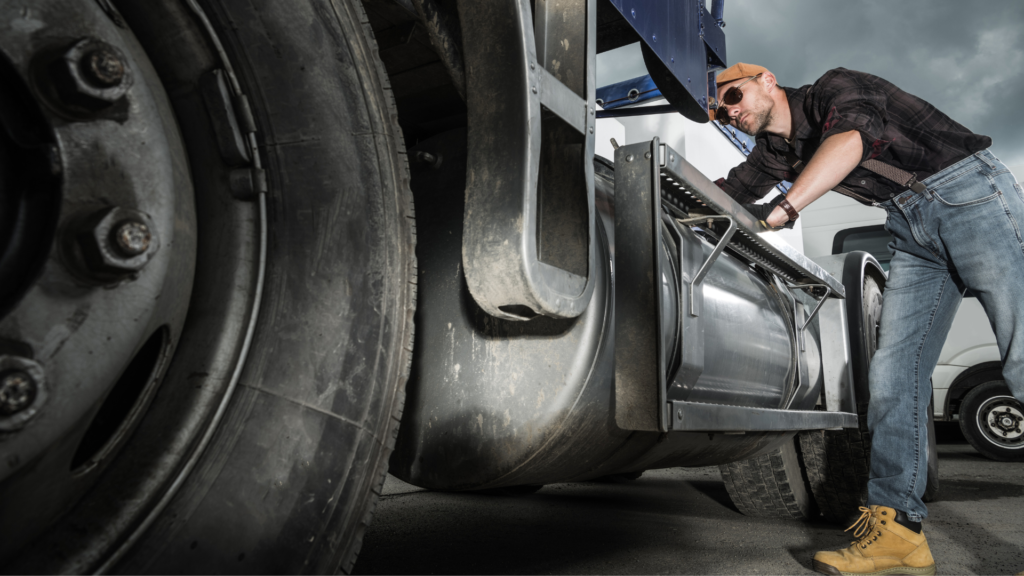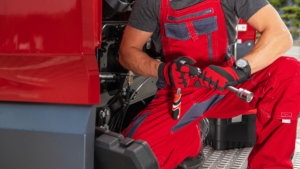Do you know what keeps your trailer safely stopping in its tracks? Trailer brake repair is a crucial aspect of maintenance that should never be overlooked. In this blog post, we’ll dive into the importance of properly functioning brakes on your trailer and how to ensure safe stops on the road. Don’t let faulty brakes put you and others at risk – read on to learn more!
Experience the power of expertise. Our technicians deliver top-quality repairs every time. Contact us here.
The importance of properly functioning trailer brakes for safe travels
Trailer brakes work hand in hand with your vehicle’s brakes to slow down and stop the combined weight of your vehicle and trailer. Without functional trailer brakes, this added weight can put excessive strain on your vehicle’s brakes, resulting in longer stopping distances and potential brake failure.
Having properly working trailer brakes also ensures better control over your vehicle-trailer combination while driving. This is especially important when navigating steep hills or making sudden stops in traffic.
Like any other component of a vehicle, regular maintenance is essential for optimal performance. It’s recommended to have your trailer brakes inspected at least once a year by a professional mechanic. However, if you frequently use your trailer or notice any changes in its braking performance, then more frequent inspections may be necessary.
We recommend you to see this article: The Benefits of Mobile Truck Repair: Getting Back on Track Faster Than Ever
Understanding Types of trailer brakes
When it comes to towing a trailer, having functioning brakes is crucial for both the safety of the driver and other vehicles on the road. Trailer brakes help reduce stopping distance, prevent accidents, and ensure safe stops while hauling heavy loads. In this section, we will discuss the different types of trailer brakes:
1. Electric Drum Brakes: These are the most common type of trailer brakes and are typically found on trailers that weigh more than 3,000 pounds. They consist of two brake shoes that press against a drum when activated by an electric current from the towing vehicle’s brake controller.
2. Hydraulic Surge Brakes: These types of brakes use a hydraulic system to activate the trailer’s brakes when pressure is applied to the towing vehicle’s brake pedal. The surge in hydraulic pressure triggers a master cylinder located on the trailer to activate its own braking system.
3. Electric Over Hydraulic Brakes: This type combines electric and hydraulic systems to provide smoother braking for heavier loads. It uses an electric actuator to convert electrical signals from the tow vehicle into hydraulic pressure that activates the brakes on each wheel.
Your salvation on the road. Explore our fast 24/7 repair services here.
Signs of Brake Trouble: How to identify potential brake issues before they become dangerous
One of the most significant signs of brake trouble is unusual noises coming from your trailer’s wheels when you apply the brakes. If you hear screeching or grinding sounds, it could indicate worn brake pads or shoes that need to be replaced immediately. Ignoring these sounds can lead to further damage to your braking system and put you at risk on the road.
Another warning sign is vibrations or pulsations felt through the steering wheel or brake pedal when applying pressure on the brakes. This could mean warped rotors or drums that need to be resurfaced or replaced. It is crucial to address this issue promptly as it can affect your ability to control and stop your trailer safely.
A spongy feeling when pressing down on the brake pedal can also indicate a problem with your braking system. This could be due to air in the brake lines, low brake fluid levels, or a faulty master cylinder. In any case, it is best to have a professional inspect and repair your brakes before they fail completely.
Pay attention to how responsive your brakes are when applied – if there is a delay in stopping after pressing down on the pedal, it could signal an issue with your hydraulic system or worn-out pads/shoes that cannot generate enough friction for quick stops.
We recommend you to see this article: Semi Repair Essentials: What Every Truck Driver Needs to Know
Tips for Safe Driving with Trailer Brakes
When it comes to towing a trailer, having functional trailer brakes is crucial for safe stops on the road. However, simply having functioning brakes is not enough. It is equally important to know how to properly use them while driving.
1. Do check your brake controller regularly: The brake controller is responsible for sending signals to the trailer brakes when you press on the pedal in your vehicle. Make sure to check it often and adjust it accordingly depending on the weight of your load.
2. Do test your brakes before hitting the road: Before embarking on a trip, make sure all your brake components – including the brake pads, drums, and rotors – are in good condition by conducting a thorough inspection.
3. Do maintain proper braking distance: When towing a trailer, it takes longer to come to a complete stop compared to just driving a car alone. Be mindful of this fact and maintain an adequate distance between you and other vehicles on the road.
4. Do use both vehicle and trailer brakes together: To ensure maximum braking power, always use both sets of brakes together – those in your vehicle as well as those on your trailer.
5. Do consider upgrading to electric over hydraulic or disc brakes: If you frequently tow heavy loads or travel through mountainous terrain, consider upgrading from traditional electric drum brakes to more advanced options like electric over hydraulic or disc brakes for better stopping power.
Get back on the road in no time. Schedule your repair here.
Don’ts for safe driving with trailer brakes
Here are some don’ts for safe driving with trailer brakes.
1. Don’t rely solely on engine braking: While using engine braking can help slow down your vehicle when descending steep hills, it should not be relied upon as your primary method of slowing down when towing a loaded trailer.
2. Don’t overload your trailer: Overloading can put excessive strain on both your vehicle’s engine and its ability to effectively utilize its braking system. Make sure to adhere to weight limits and distribute the load evenly on your trailer.
3. Don’t ignore warning signs: If you notice any unusual noises or vibrations while braking, it could be a sign of brake issues. Never ignore these warning signs and have them inspected and repaired immediately.
4. Don’t wait until the last minute to brake: When towing a trailer, it takes longer to come to a complete stop compared to just driving a car alone. Avoid sudden braking at high speeds by anticipating stops ahead of time and gradually slowing down.
5. Don’t neglect regular maintenance: Keeping up with routine maintenance for your vehicle’s brakes and your trailer’s brakes is crucial for safe driving with trailer brakes. Neglecting maintenance can lead to costly repairs or even dangerous situations on the road.
For more tips and info, follow us on Facebook and Instagram. Call us for truck repair road service on: trucktrailerrepairservice.com




